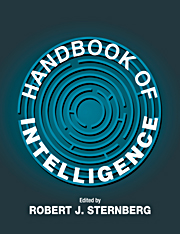Book contents
- Frontmatter
- Contents
- Preface
- Contributors
- PART I THE NATURE OF INTELLIGENCE AND ITS MEASUREMENT
- 1 The Concept of intelligence
- 2 History of Theories and Measurements of intelligence
- 3 Contemporary Models of Intelligence
- PART II DEVELOPMENT OF INTELLIGENCE
- PART III GROUP ANALYSES OF INTELLIGENCE
- PART IV BIOLOGY OF INTELLIGENCE
- PART V INTELLIGENCE AND INFORMATION PROCESSING
- PART VI KINDS OF INTELLIGENCE
- PART VII TESTING AND TEACHING INTELLIGENCE
- PART VIII INTELLIGENCE, SOCIETY, AND CULTURE
- PART IX INTELLIGENCE IN RELATION TO ALLIED CONSTRUCTS
- Author Index
- Subject Index
3 - Contemporary Models of Intelligence
Published online by Cambridge University Press: 05 June 2012
- Frontmatter
- Contents
- Preface
- Contributors
- PART I THE NATURE OF INTELLIGENCE AND ITS MEASUREMENT
- 1 The Concept of intelligence
- 2 History of Theories and Measurements of intelligence
- 3 Contemporary Models of Intelligence
- PART II DEVELOPMENT OF INTELLIGENCE
- PART III GROUP ANALYSES OF INTELLIGENCE
- PART IV BIOLOGY OF INTELLIGENCE
- PART V INTELLIGENCE AND INFORMATION PROCESSING
- PART VI KINDS OF INTELLIGENCE
- PART VII TESTING AND TEACHING INTELLIGENCE
- PART VIII INTELLIGENCE, SOCIETY, AND CULTURE
- PART IX INTELLIGENCE IN RELATION TO ALLIED CONSTRUCTS
- Author Index
- Subject Index
Summary
CONTEMPORARY MODELS OF INTELLIGENCE
What does it mean for someone to be intelligent or for one person to be more intelligent than another? Not surprisingly, the answers to these questions depend upon the level at which they are addressed. Because intelligence is assessed by members of a society, its conceptualization often takes several forms that can vary according to when, where, and how the assessment occurs.
Despite the inherent difficulty in defining and measuring human intelligence, the goal is a worthy one. Understanding a society's views of intelligence and making these views explicit means that valuable talents can be identified and fostered. In addition, finding the sources of this elusive construct advances our scientific knowledge about the workings of the human mind.
One method for understanding intelligence is through theory-based models. These models often use metaphors to explain existing research on intelligence and clarify future questions (Sternberg, 1990). However, they must also meet certain criteria to be useful to society and to science. First, the models must be based on relevant assumptions and empirical support, build on previous knowledge, and be falsifiable. Second, the elements and the mechanisms by which the elements interact need to be well specified and internally consistent. Third, the models should describe, explain, and predict intelligent behavior over time and across situations. Finally, the models must be fruitful in generating new research and applications that advance the field of intelligence.
- Type
- Chapter
- Information
- Handbook of Intelligence , pp. 34 - 50Publisher: Cambridge University PressPrint publication year: 2000
- 25
- Cited by



